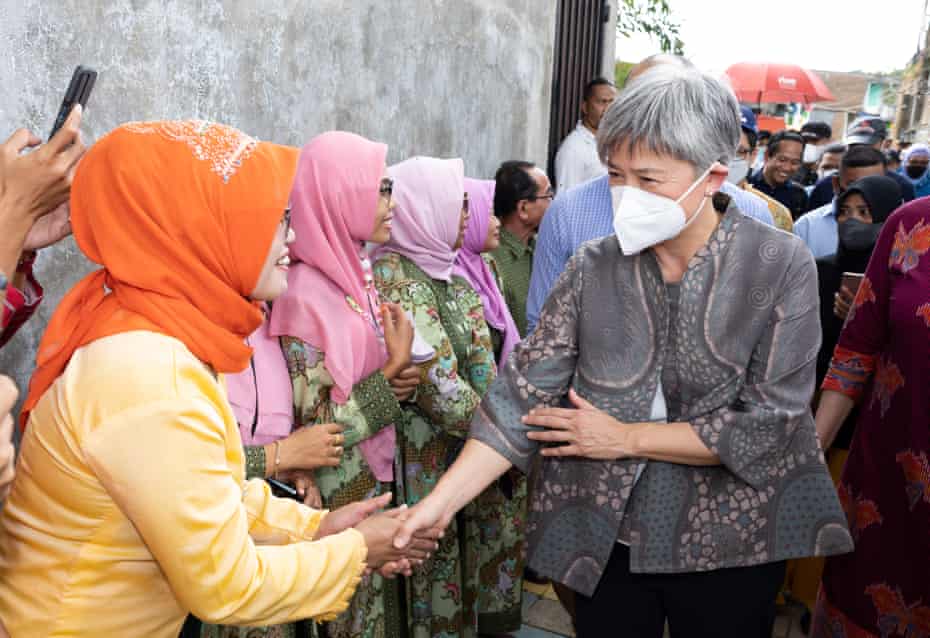Extract from The Guardian

The whole neighbourhood has turned out. Everyone has their phones up filming Australia’s new foreign affairs minister and her crew of fly-in fixers – diplomats, advisers, security. A cat lolls in a doorway. A steady-eyed preschooler flips Wong the peace sign and then hides behind her parents.
The visitors hurtle through the aid project and various people explain the technical elements to the Australian minister. Wong frets about a young girl who has clambered up on a wall near her, with her phone aloft. The minister is anxious the kid will tumble into the mud and weeds below.
While watching the girl out of one eye, Wong cracks a joke to the man standing next to her, who is explaining how dirty water is treated in the project. Wong tells him she once had a different portfolio – less international jet-setting but also pretty fraught.
“I was once minister for water,” Wong says. She waits a beat. “When there was no water.” The Indonesians laugh at this strange parallel universe of a dry, arid continent. No humidity. No dank water in channels harbouring disease.
Wong has exploded out of the blocks since it became clear a fortnight ago that Labor had won the May federal election and she would get the opportunity to be Australia’s foreign minister in this region, at this moment, in these times.
She went to Tokyo with Anthony Albanese in the opening days of the new government. Then two trips to the Pacific. Now Jakarta and Makassar.
In Jakarta, after the prime minister shared a bonding bike ride with Joko Widodo in the grounds of the Bogor Palace, the Department of Foreign Affairs and Trade circulated a social media message from Wong speaking in Bahasa – quite the diplomatic flex, but that’s the point. The point is to be seen.
China is currently engaged in high visibility courtship of the Indo-Pacific and Wong is countering with her own hearts and minds tour. Her predecessor Marise Payne was a serious and competent person but she wasn’t performative, either by temperament or design.
The question affords Australia’s neighbours respect and agency and it also leaves some room for nuance. Not every neighbour views China in the same way Australia does, and not every neighbour’s view is informed and shaped by the security alliance that Australia has sought with the US ever since John Curtin looked to America.
Wong’s open-ended pitch is intended to respect national differences as much as the commonalities. The question is also designed to prompt neighbours to look beyond their immediate material needs, and consider how they would like things to be in the next 10 or 20 years.
Australia’s strategic contrast with Beijing is implied, not stated. China’s courtship engages developing countries at the transactional level – what are your immediate needs and how can partnership with us serve them?
Wong is entirely comfortable in this zone because she is a child of the region. Her own story projects the fundamentals of her message: we all have unique traits but we have shared and blended destinies.
But Wong doesn’t govern in times of regional equanimity. China’s regression towards authoritarianism and the escalation of great power competition has handed the current government a more fraught set of dynamics. Albanese and Wong possess the Keating instincts, but they have to tweak and tune the model.
This joint project from Albanese and Wong remains a work in progress.
In Indonesia, Albanese and Wong were very much the team. Albanese favours an empathic leadership style of personal networks and relationships, and he’s projecting those values into his first foreign policy forays.
Wong projects focus, authority and accomplishment. Privately, Albanese pretends Wong is mean to him, and Wong pretends she’s playing second fiddle when it’s clear these opening two weeks have been animated to a very large extent by her aspiration to be a serious person in serious times.
Albanese on Tuesday became the first Australian prime minister to visit the city of Makassar in the Sulawesi region. He wanted to go there both as a gesture to Widodo and as a nod to his own ambitions for the country he now leads.
Albanese clearly felt the resonance of the shared territorial history. Makassar people travelled to the Arnhem Land coast from 1700 right through to 1907, and Makassar people travel still to Australia seeking higher education, business opportunities and enduring friendship.
Albanese wants to leave a legacy: an Australia mature enough to be reconciled with First Nations people, to embrace our complete history. He also wants to shape an Australia brave and confident enough to be bound forever to the region where we share a destiny.
Obviously, it’s far too soon to say whether or not he will get his wish. The dreams of the last Labor government that Albanese and Wong served in were destroyed by rancorous self-indulgence and personality conflict.
But this much can be observed: two weeks after 21 May, Australia’s voice is being heard in the neighbourhood.
On Tuesday, in South Sulawesi, locals lined the roads and stood on top of their cars to get a vantage point. The new Australian prime minister, or perhaps more precisely his speeding motorcade, brought the regional city of Makassar to a complete standstill.
No comments:
Post a Comment